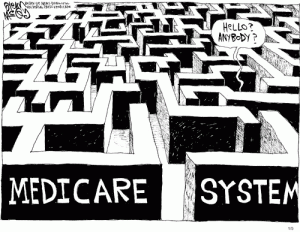In addition to blogging about the senior housing industry I am a business development officer forVigil Health Solutions. Vigil sells the best emergency call systems available to senior housing communities. About 70% of our business comes in the form of newly constructed communities. and at any given time, we have several dozen opportunities that are stalled out because they either can’t get financing or because they are slowly muddling through the HUD financing process which often takes one to two years.
Yet in spite of the current financial turmoil, there are a significant number of projects that do get funded and built. It is obviously easier for larger multi community owners than for smaller owners or first time owners. That being said, even the large established developers find they are having to contribute significant equity in order to get financing. Recently I was able to interview a first time senior housing developer who was able to find conventional financing and his project is currently under construction. He agreed to walk me through how he accomplished this.
The development team was a local physician who specialized in dementia care and a local developer in a mid sized city. They had a great conceptual framework for their new community, secured a parcel of land and hired an architect. They went through the entitlement process (land use approvals) and began looking for financing.
Their initial thinking was to use the HUD senior housing program because it there is money available, the loan is non-recourse and at first glance has attractive modest equity requirements. But as the development team proceeded down the financing path they found there were a number of requirements that made HUD a far from ideal solution:
A. The time frame to get funded was 12-24 months.
B. There were some physical plant requirements such as a traditional nurse call system that made no sense for a dementia community.
C. HUD requires a number of very significant reserve funds, that are essentially untouchable by the developer or operator. As a result, the lower equity requirements end up being less attractive than they might first appear.
D. Financing using a HUD guarantee requires paying Davis Bacon wages which would add at nearly 10% to the hard cost of the project.
Not wanting to use HUD if at all possible, they approached a local regional bank where they already had a relationship. They presented their feasibility studies, appraisals, developer financial statements and financial projections and the bank was interested.
The deal took about 3 months to structure and gave the developers a 5 year loan that will cover the construction and initial fill-up period. The idea is that by the end of the loan term, the owner will have a well established cash flow which will give them the ability to find longer term financing. However as a safety value, they have an option to renew the loan an additional five years. Finally, it turned out that after taking into account the HUD reserve requirements the amount of equity required by the bank, was just slightly more than what would have been required using HUD.
Ultimately HUD financing is attractive because it is available, it is non-recourse and has a fixed rate for 40 years. However for this developer the cost savings and flexibility provided by the bank made the decision a no brainer.
By: Steve Moran
Don’t miss a single issue of Senior Housing Forum, subscribe today. It is free! We do not sell or share your contact information. It is practical and never too long.
Go to the main page of Senior Housing Forum and on the right hand side you will see a place to enter your email to subscribe. You will receive notification when a new article is posted. You can unsubscribe at any time.









We faced similar challenges when building a 40 bed facility recently. We looked at all financing options and decided on the SBA 504 loan program, which provides approximately 40% of the total construction funds (via a US backed bond debenture) on a 20 year fixed term at relatively low fixed interest rates. The equity requirements were in the 10-15% range and a lead bank provided the 1st loan with very favorable interest rates due to the low risk exposure of only about 50% loan-to-cost. I’d be happy to share my experience and put those looking for financing in touch with SBA CDC’s whom I have found to really understand the senior housing space.